Women's Health Magazine Green Goddesses
Green Goddesses
April 2011
In honor of Earth Day, we deifying these five women for their devotion to protecting our future. Here, they give us an eye-opeing look at what it takes to live a more eco-aware existence. You may be surprised at how easy – and rewarding – healing the planet can be.
By Loren Chidoni
Photographs by Ture Lillegraven
VIEW the FULL ARTICLE online HERE
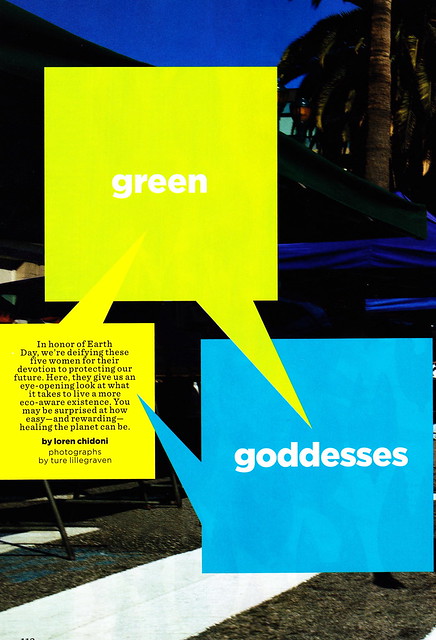
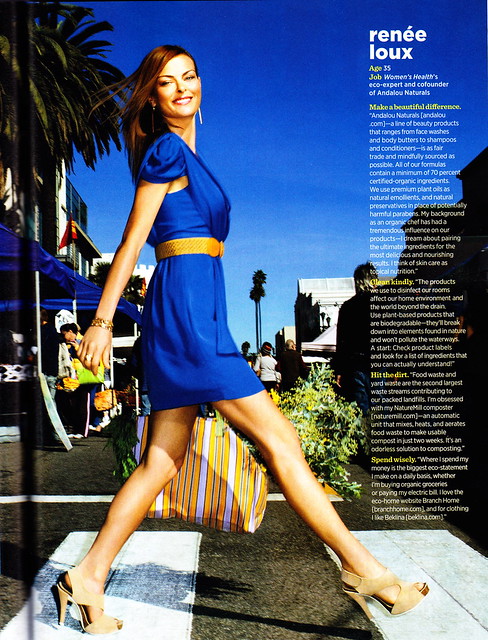
Renée Loux
Age 35
Job Women’s Health’s eco-expert and cofounder of Andalou Naturals
Make a beautiful difference.
“Andalou Naturals [andalou.com] – a line of bauty products that ranges from face washes and body butters to shampoos and conditioners – is as fair trade and mindfully sourced as possible. All of our formulas contain a minimum of 70 percent certified-organic ingredients. We use premium plant oils as natural emollients, and natural preservatives in place of potentially harmful parabens. My background as an organic chef has had a tremendous influence on our products – I dream of pairing the ultimate ingredients for the most delicious and nourishing results. I think of skin care as topical nutrition.”
Clean kindly.
“The products we use to disinfect our rooms affect our home environment and the world beyond the drain. Use plant-based products that are biodegradable – they’ll break down into elements found in nature and won’t pollute our waterways. A start: Check product labels and look for a list of ingredients that you can actually understand!”
Hit the dirt.
“Food waste and yard waste are the second largest waste streams contributing to our packed landfills. I’m obsessed with my NatureMill composter [naturemill.com] – an automatic unit that mixes, heats, and aerates food waste to make usable compost injust two weeks. It’s an odorless solution to composting.”
Spend wisely.
“Where I spend my money is the biggest eco-statement I make on a daily basis, whether I’m buying organic groceries or paying my electric bill. I love the eco-home website Branch Home [branchhome.com], and for clothing I like Bleinka [belinka.com].”
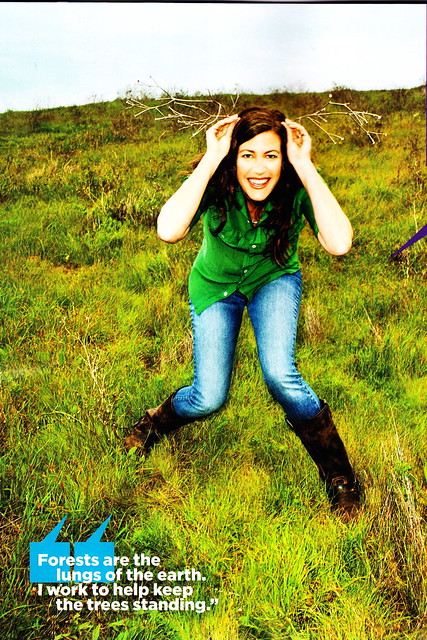
Rebecca Tarbotton
Age 37
Job Executive director of the Rainforest Action Network
Push your way to the top.
“We [the Rainforest Action Network staff] ask tough questions: ‘Hey, Big Corporation, where are you getting the palm oil for your products? You shouldn’t be getting it from the rain forests in Indonesia, which have the fastest rate of deforestation in the world.’ So far, RAN has gotten eight major banks to commit to stop financing mountaintop removal, which involves blowing off the tops of mountains to get coal.
Speak up – loudly.
“I encourage people to do things in which their voice can actually make a change. When we take action collectively, such as meeting with a corporation’s executives and pressuring them to alter the way they do business, you can see the change happening.”
Make the right hard choices.
“When you’re purchasing wood items, look for products that are certified by the Forest Stewardship Council [they usually have a stamp], and avoid all hardwoods from the tropics such as teak, mahogany, and rosewood. Also, buy furniture made out of reclaimed wood from old houses and fallen trees.”
Power down.
“Turning off your appliances and lights when you’re not using them can have a huge impact on energy use and the environment, so give yourself a break from the computer and television screen for at least an hour every night.”
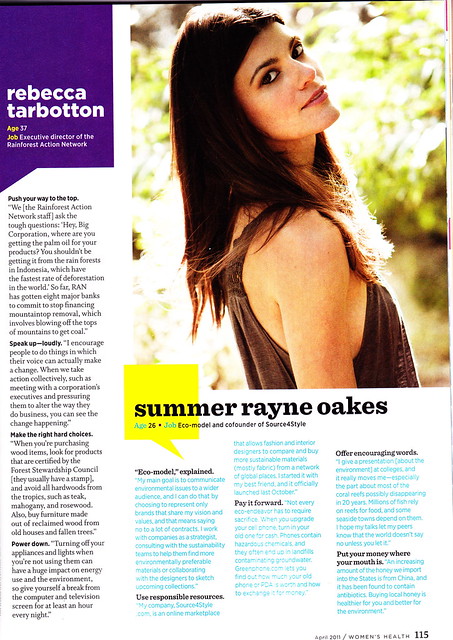
Summer Rayne Oakes
Age 26
Job Eco-model and cofounder Source4Style
“Eco-model” explained.
“My main goal is to communicate environmental issues to a wider audience, and I can do that by choosing to represent only brands that share my vision and values, and that means saying no to a lot of contracts. I work with companies as a strategist, consulting with the sustainability teams to help them find more environmentally preferable materials or collaborating with the designers to sketch upcoming collections.”
Use responsible resources.
“My company Soure4Style.com, is an online marketplace that allows fashion and interior designers to compare and buy more sustainable materials (mostly fabric) from a network of global places. I started it with my best friend, and it officially launched last October.”
Pay it forward.
“Not every eco-endeavor has to require sacrifice. When you upgrade your cell phone, turn your old one in for cash. Phones contain hazardous chemicals, and they often end up in landfills contaminating groundwater. Greenphone.com lets you find out how much your old phone or PDA is worth and how to exchange it for money.”
Offer encouraging words.
“I give a presentation [about the environment] at colleges, and it really moves me–especially the part about most of the coral reefs possibly disappearing in 20 years. Millions of fish rely on reefs for food. And some seaside towns depend on them. I hope my talks let my peers know that the world doesn’t say no unless you let it.”
Put your money where your mouth is.
“An increasing amount of the honey we import into the States is from China, and it has been found to contain antibiotics. Buying local honey is healthier for you and better for the environment.”
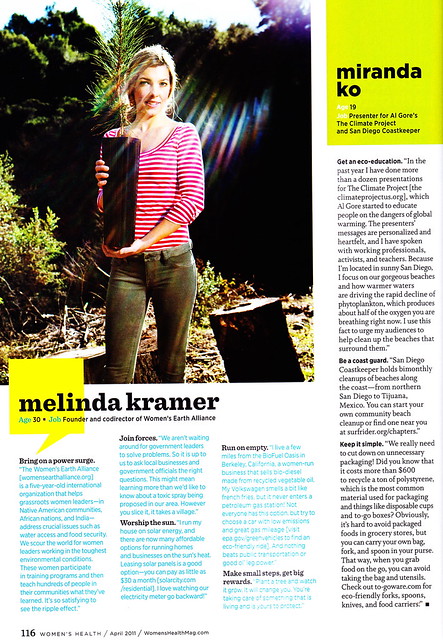
Melinda Kramer
Age 30
Job Founder and codirector of Women’s Health Alliance
Bring on a power surge.
“The Women’s Earth Alliance [womensearthalliance.org] is a five-year-old international organization that helps grassroots women leaders – in Native American communities, African nations, and India – address crucial issues such as water access and food security. We scour the world for women leaders working in the toughest environmental conditions. These women participate in training programs and then teach hundreds of people in their communities what they’ve learned. It’s so satisfying to see the ripple effect.”
Join forces.
“We aren’t waiting around for government leaders to solve problems. So it is up to us to ask local businesses and government officials the right questions. This might mean learning more than we’d like to know about a toxic spray being proposed in our area. However you slice it, it takes a village.”
Worship the sun.
“I run my house on solar energy, and there are now many affordable options for running homes and businesses on the sun’s heat. Leasing solar panels is a good option – you can pay as little as $30 a month [solarcity.com/residential]. I love watching our electric meter go backwards!”
Run on empty.
“I live a few miles from the BioFuel Oasis in Berkeley, California, a women-run business that sells bio-diesel made from recycled vegetable oil. My Volkswagen smells a bit like French fries, but it never enters a petroleum gas station! Not everyone has this option, but try to choose a car with low emissions and great gas mileage [visit epa.gov/greenvehicles to find an eco-friendly ride]. And nothing beats public transportation or good ol’ leg power.”
Make small steps, get big rewards.
“Plant a tree and watch it grow. It will change you. You’re taking care of something that is living and yours to protect.”
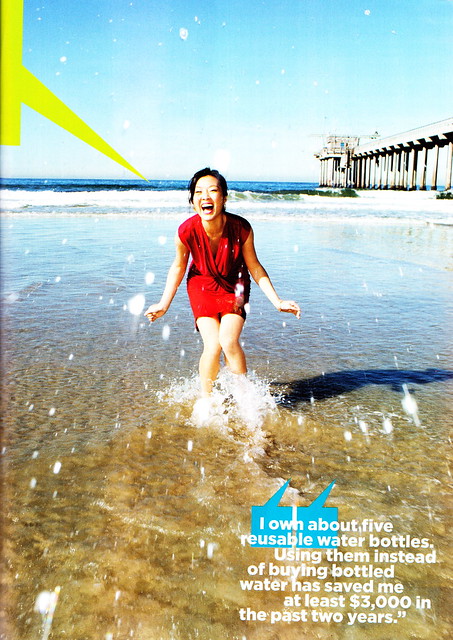
Miranda Ko
Age 19
Job Presenter for Al Gore’s The Climate Project and San Diego Coast Keeper
Get an eco-education.
“In the past year I have done more than a dozen presentations for The Climate Project [theclimateprojectus.org], Which Al Gore started to educate people on the dangers of global warming. The presenters’ messages are personalized and heartfelt, and I have spoke with working professionals, activists, and teachers. Because I’m located in sunny San Diego, I focus on our gorgeous beaches and how warmers waters are driving the rapid decline of phytoplankton, which produces about half of the oxygen you are breathing right now. I use this fact to urge my audiences to help clean up the beaches that surround them.”
Be a coast guard.
“San Diego Coastkeeper holds bimonthly cleanups of beaches along the coast – from northern San Diego to Tijuana, Mexico. You can start your own community beach cleanup or find one near you at surfrider.org/chapters.”
Keep it simple.
“We really need to cut down on unnecessary packaging! Did you know that it costs more than $600 to recycle a ton of polystyrene, which is the most common material used for packaging and things like disposable cups and to-go boxes? Obviously, it’s hard to avoid packaged foods in grocery stores, but you can carry your own shopping bag, fork, and spoon in your purse. That way, when you grab food on the go, you can avoid taking the bag and utensils. Check out t-goware.com for eco-friendly forks, spoons, knives and food carriers.”
Tagged: articles

